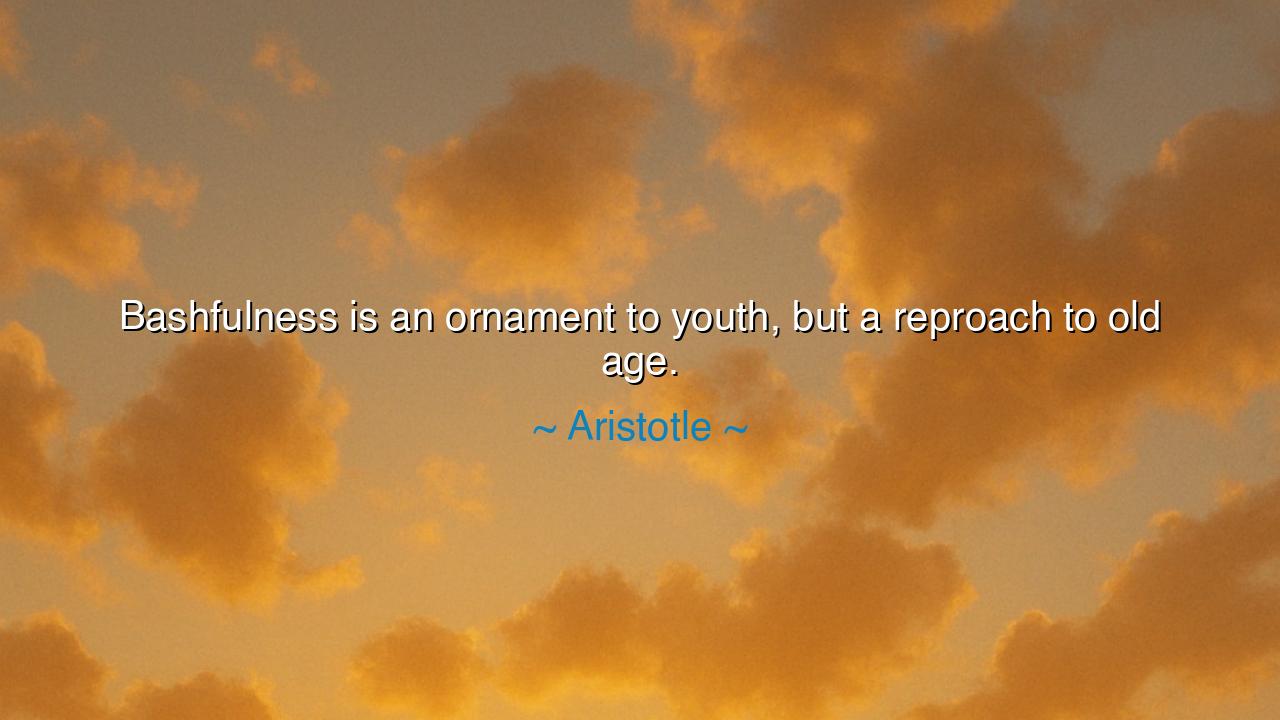
Bashfulness is an ornament to youth, but a reproach to old age.






"Bashfulness is an ornament to youth, but a reproach to old age." - Aristotle. These words echo with the wisdom of the ancients, calling our attention to the virtue of bashfulness and its changing role as we age. In youth, bashfulness, or modesty, is often seen as a beautiful and innocent quality. It reflects the humility and naivety of a young soul, still learning the ways of the world. It is the unspoken respect for others, a sensitivity to how one is perceived, and a gentle restraint in actions and speech. Yet, as Aristotle notes, this very quality, once considered an ornament of youth, becomes a reproach as one grows older. In maturity, bashfulness can be seen as a sign of weakness, a failure to fully embrace the wisdom, courage, and self-assurance that should come with experience.
Consider the life of Socrates, one of the greatest minds in ancient Greece. In his youth, Socrates was known for his humble nature, constantly questioning and learning from others. But as he grew older and became a renowned philosopher, his bashfulness was replaced by a boldness and a fearlessness in the pursuit of truth. Socrates did not shrink from exposing the faults of the Athenian society, nor did he fear to challenge the most powerful minds of his time. His willingness to speak plainly and act with unshakable conviction stands as a model for how age should bring with it confidence and assertiveness. Bashfulness, in Socrates' case, was not a trait that served him in his later years. Rather, it was the full embrace of his intellectual and moral maturity that allowed him to challenge the world around him.
This transformation from bashfulness to boldness is not merely a personal evolution, but a natural part of life. As Aristotle teaches, as one ages, the moral and intellectual growth should grant us the courage to stand firm, to express ourselves freely, and to take action without hesitation. In our youth, we are often bound by fear of judgment or rejection, and this is reflected in our bashfulness. But in old age, when we have learned the lessons of life, faced our fears, and accumulated wisdom, we should cast aside the self-doubt that once held us back and instead speak with the confidence of someone who has lived fully.
Consider the life of Benjamin Franklin, who, in his later years, became not only an influential leader in America but also a diplomat, philosopher, and statesman. As a younger man, Franklin was reserved in his interactions, but with age, he became known for his wit, his ability to negotiate, and his sharp intellect. His contributions to the American Revolution, to the crafting of the U.S. Constitution, and to the world of science and philosophy were marked by his refusal to be bashful, to hold back in the face of great challenges. Franklin’s life exemplifies the idea that as we age, we must grow into the boldness and assertiveness that our experiences grant us, and not let bashfulness or self-consciousness limit us.
The lesson that Aristotle imparts is one of personal growth and embracing the fullness of life as we age. Bashfulness in youth, he suggests, is understandable—it is a mark of innocence, a reflection of one’s inexperience. But as we grow older and wiser, we must shed this restraint. Instead of being afraid to speak our minds, to take bold action, or to assert our beliefs, we should do so with the confidence and strength that our life’s journey has instilled in us. In the face of adversity, the elderly should stand as figures of strength and wisdom, not shrinking from the challenges of life but embracing them with the courage that only age can provide.
This is not to say that humility should be cast aside, but that true humility is not about bashfulness or self-doubt. True humility is the ability to know oneself, to recognize our own strengths and weaknesses, and to act with purpose and conviction, regardless of the judgment of others. Courage is not simply about bold actions but about being true to the wisdom and integrity that come with age.
Thus, the practical advice we can take from Aristotle is this: grow into your wisdom as you age, and do not hide behind the mask of bashfulness. Embrace the knowledge, the experience, and the self-assurance that time has granted you. Use your years not to shrink into the shadows, but to step boldly into the light, sharing your insights, your strengths, and your vision with those around you. Let your life, like Socrates and Franklin, be a testament to the strength that comes from embracing your maturity and self-knowledge, and let bashfulness become a thing of the past.






AAdministratorAdministrator
Welcome, honored guests. Please leave a comment, we will respond soon